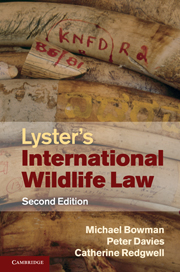Book contents
- Frontmatter
- Contents
- Foreword
- Preface
- List of abbreviations
- PART I Foundations of international wildlife law
- PART II Species regulation
- 5 Fish
- 6 Cetaceans
- 7 Birds
- PART III Regional wildlife regulation
- PART IV Global wildlife regulation
- PART V Biological diversity: a new perspective on wildlife regulation
- PART VI Cross-sectoral issues in wildlife regulation
- PART VII Conclusion
- Index
- References
5 - Fish
Published online by Cambridge University Press: 05 July 2011
- Frontmatter
- Contents
- Foreword
- Preface
- List of abbreviations
- PART I Foundations of international wildlife law
- PART II Species regulation
- 5 Fish
- 6 Cetaceans
- 7 Birds
- PART III Regional wildlife regulation
- PART IV Global wildlife regulation
- PART V Biological diversity: a new perspective on wildlife regulation
- PART VI Cross-sectoral issues in wildlife regulation
- PART VII Conclusion
- Index
- References
Summary
Background
The need for international regulation of marine fisheries is self-evident given that many fish species spend some or all of their life cycle crossing national maritime zones and/or in areas beyond national jurisdiction. Traditionally, international law recognised freedom of fishing beyond the territorial sea, with legal title to the resource arising only on capture. This led Garrett Hardin in a seminal article in the 1960s to note the ‘tragedy of the commons’: in the absence of ownership and of international co-operation with respect to high-seas fish stocks in particular, the oceans had become a ‘free for all’. Sharks, rays, turtles and tuna are amongst the high-seas stocks which have suffered serious depredation, with several species now listed on CITES Appendices.
As with many other forms of wildlife regulation, the initial impetus for international regulation of fish stocks was conservation of commercially exploited species for economic benefit. Increasingly, however, the conservation of fish stocks as an ultimately exhaustible natural resource and of fish species as part of marine ecosystem management has emerged as an additional objective, and is found reflected in more recent instruments such as the sustainable-use obligations of the 1995 Agreement on Straddling and Highly Migratory Fish Stocks (SSA), considered further below.
- Type
- Chapter
- Information
- Lyster's International Wildlife Law , pp. 121 - 149Publisher: Cambridge University PressPrint publication year: 2010



